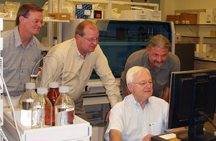
| RELATED INFO |
| * Bindley Bioscience Center |
| * Chematics Inc |
| * Discovery Park |
| * Center for Analytical Instrumentation Development |

August 13, 2008
Purdue researchers, Indiana firm form company to improve marijuana detection
WEST LAFAYETTE, Ind. - |
Intelimmune LLC will focus on developing a more reliable and accurate diagnostic tool for detecting the presence of tetrehydrocannabinol (THC), the active ingredient in marijuana, said Fred Regnier, Purdue's John H. Law Distinguished Professor Analytical Chemistry.
"Intelimmune's process has strong applications for federal, state and local law enforcement as well for the medical industry," said Regnier, who will serve as a chief technical officer in the new company. "This also is another example of how researchers at Discovery Park's Bindley Bioscience Center and Purdue's new Center for Analytical Instrumentation Development can make a difference in working with life sciences companies to deliver ideas to the marketplace."
Tim Woenker, Intelimmune's president, said he was drawn to Bindley and Discovery Park by their interdisciplinary approach to research and modern laboratories and equipment for developing this process. Woenker also is president of North Webster-based Chematics Inc., a privately held company founded in 1971.
"This collaboration is an excellent opportunity as we grow our company, and it's a great opportunity for Discovery Park and Purdue as they work to deliver products and processes that can make a real difference in society," said Woenker, a Purdue graduate. "Purdue also has a strong commitment to engage with Indiana companies to help create jobs and grow the state's economy."
Jiri Adamec, research assistant professor at Bindley, said the current test for THC is based on unstable antibodies and fraught with problems. Intelimmune researchers hope to devise a process that's much more precise and reliable.
"Law enforcement can use breathalyzers to determine whether a person is above the legal limit for alcohol use, and saliva is used to detect the presence of marijuana, or THC, in a person's system, but that test isn't reliable," Adamec said. "We look to deliver a proven process that will vastly improve on the present-day test for marijuana."
Adamec, who will serve as a technical officer for Intelimmune, said the process being developed by the company also is a saliva test, but it will not use protein-based antibodies. Instead, he said, it will employ a process known as "molecular imprinting," in which an artificial antibody is used to capture THC. Results from this process also would be available in about five minutes, which is comparable to existing diagnostic tools.
Researchers say the membranes of certain nerve cells in humans contain protein receptors that bind THC. Once securely in place, the chemical kicks off a series of cellular reactions that lead to the high users experience when they smoke marijuana.
Chematics develops and manufactures novel in-vitro diagnostic testing solutions and products that facilitate early identification of abnormal or unhealthy conditions.
Purdue launched the Center for Analytical Instrumentation Development in May to focus on development of analytical instruments critical to a wide range of fields including health care and national security. The center will foster collaborations among the leading institutions in the field, including Purdue, University of Illinois, Indiana University and the University of Notre Dame.
Purdue's R. Graham Cooks, the Henry Bohn Hass Distinguished Professor of Chemistry, and Regnier are co-directors of the center.
Purdue's analytical chemistry program ranked second in the nation, the University of Illinois is ranked third and Indiana University is ranked fourth, according to U.S.News & World Report.
Writer: Phillip Fiorini, (765) 496-3133, pfiorini@purdue.edu
Sources: Fred Regnier, (765) 494-3878, fregnier@purdue.edu
Tim Woenker, (574) 834-2406, sales@chematics.com
Jiri Adamec, (765) 496-6148, jadamec@purdue.edu
Purdue News Service: (765) 494-2096; purduenews@purdue.edu
PHOTO CAPTION:
Brothers Tim and Ed Woenker (from left), top executives at North Webster, Ind.-based Intelimmune LLC, discuss a joint research project for developing a process to detect THC in a person's system with Purdue chemistry professor Fred Regnier, seated, and Jiri Adamec, research assistant professor at the Bindley Bioscience Center. (Purdue News Service photo/Phillip Fiorini)
To the News Service home page
